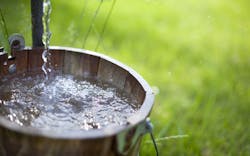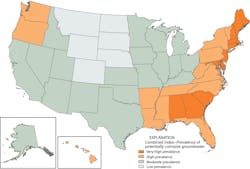Drinking Water News: Highly corrosive groundwater in 25 states, Florida increases chemical allowances
Florida commission approves proposal to increase drinking water chemical allowances
The environmental Regulatory Commission of Florida created by Governor Rick Scott voted July 26 to increase the number of regulated chemicals in Florida drinking water. The date was moved up from September, according to the Tampa Bay Times and Miami Herald.
The proposal raises the number of allowable chemicals in drinking water from 54 to 92. While the panel plans to reduce the allowable limits on 13 regulated chemicals, including cyanide and beryllium, the new proposal raises the allowable limit on more than 24 other known carcinogens "from levels that are from 20 percent to 1,100 percent higher than the current standards."
The update is the first update to the Clean Water Act in Florida since 1992. However, the proposal saw heated opposition from both environmentalists, who say it only weakens Florida’s existing guidelines, and residents, with 2,700 in the state signing a petition against the proposal.
USGS well assessment finds 25 states with highly corrosive groundwater
Click to view larger. Image courtesy of the U.S. Geological Survey.
High or very high prevalence of corrosive groundwater was discovered in 25 states in a 2016 U.S. Geological Survey (USGS) assessment of 20,000 wells across the U.S. USGS looked for two indicators of potential corrosivity and found corrosive groundwater in all 50 states and Washington DC.
Alabama, Delaware, Connecticut, Georgia, Maine, Maryland, Massachusetts, New Hampshire, New Jersey, Rhode Island, South Carolina and the District of Columbia all had a very high prevalence of potentially corrosive groundwater.
Arkansas, Florida, Louisiana, Mississippi, North Carolina, New York, Oregon, Pennsylvania, Tennessee, Vermont, Virginia, West Virginia and Washington each had a high prevalence of potentially corrosive groundwater.
"The corrosivity of untreated groundwater is only one of several factors that may affect the quality of household drinking water at the tap," USGS Associate Director for Water Don Cline said. "Nevertheless, it is an essential factor that should be carefully considered in testing for water quality in both public and private supplies nationwide."
The survey, titled Assessing the Potential Corrosivity of U.S. Groundwater," also found that, while approximately 15 percent of the population depends on private wells for drinking water, many do not perform the basic testing necessary to ensure safe water.
The full report can be found HERE.
Water supplies affected in two Canadian cities after Husky oil spill
Two cities in Canada’s Saskatchewan province have stopped drawing drinking water from the North Saskatchewan River after a Husky Energy Inc. pipeline leaked oil and diluent into the river on July 21. Efforts to contain the spill the following day were unsuccessful.
The city of North Battleford stopped drawing drinking water quickly after the spill, and the city of Prince Albert was forced to do the same on July 25. Prince Albert officials met the same day to explore plans for dealing with the issue including restricting water use for residents and using rainwater after reserves were exhausted.
The oil spill is expected to cost the cities millions of dollars and hit nearby farmers, who depend on Prince Albert’s water supply, most severely, according to reuters.com.

